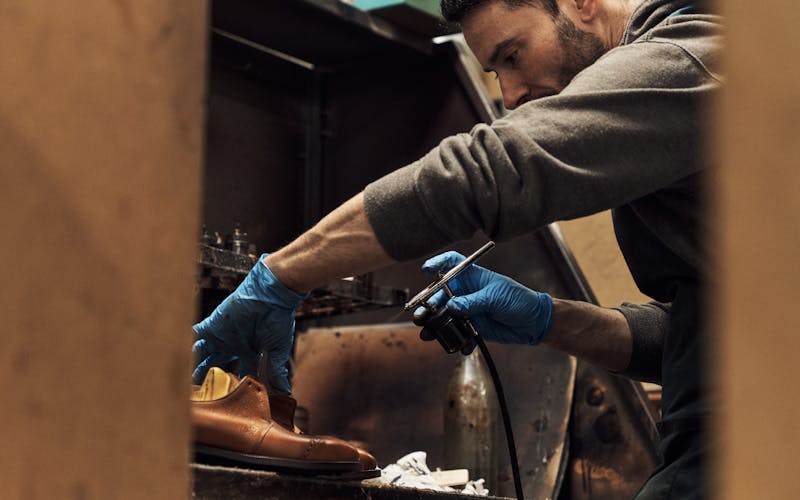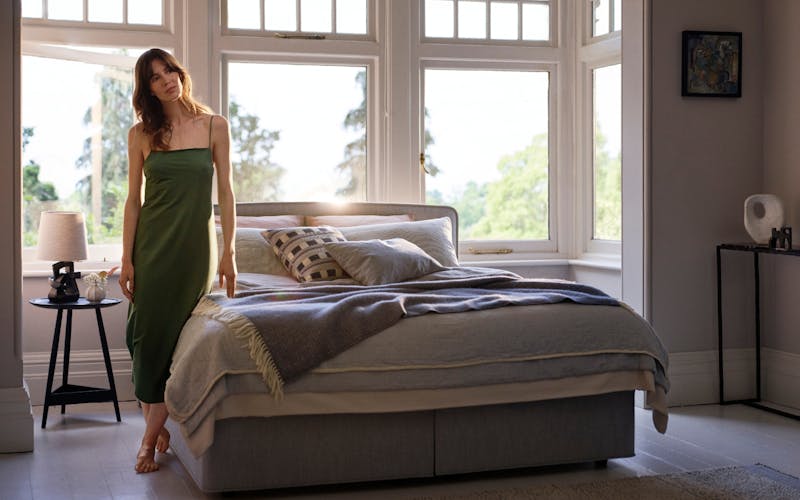

for Walpole members and
non-members available now
at The Londoner



It was always an event when Isabella Blow came into the office. At the time, I was deputy editor on the Sunday Times Style magazine, working in the very unstylish environs of a Wapping former warehouse, surrounded by whey-faced men in crumpled grey suits. (I remember the wild excitement when a supermarket opened nearby with a deli counter, freeing us from the greasy slop on offer in the office canteen). But then Blow would blow in. You knew of her impending arrival before you saw her; there would be the odd giggle from the news desk, and (or perhaps this was my imagination) a waft of Fracas. Then, her headdress would appear over the partition, followed by Issie herself, perhaps in a metal corset, or a lampshade skirt, wearing odd shoes, with a lobster or a ship on her head, or a lace mask over her eyes, and always, always with scarlet lipstick which occasionally had smudged on her teeth or down her chin. To the rest of us jeans-wearing desk slaves, Blow was a joke and a liability –she was erratic, and though her fashion shoots were exquisite, they could be eye-wateringly expensive.
Working with an eccentric is rarely easy. But a decade after her death, Blow’s bohemian vision has proved far-reaching. Her influence on British fashion has endured –and not just because of her discovery and promotion of other creative geniuses such as Alexander McQueen and Philip Treacy. Today, her iconoclastic aesthetic has found a fresh flowering in the creations of a new generation of British luxury designers, such as Molly Goddard, with her frothy tulle confections that are a favourite with Rihanna, and Richard Quinn, with his oversized printed foils and marabou feather trousers.
For other nations, luxury may be epitomised by three-ply cashmere, butter-soft leather, knitted silk and neat tailoring. For the British, it is expressed as an emotion: unique, creative, non-conformist, brimming with a sense of turbulent energy, freedom and, often, wit.
The question is, why should this be? Ours, after all, is an island replete with internal contradictions. It remains, on many levels, hide-bound, rule-bound and class-conscious to a degree that makes it all but impenetrable to others. Betjeman’s fabulously snobbish poem How to Get on in Society was written in 1958 and remains brutally accurate today in its skewering of the pretensions of the nouveaux riches: “You kiddies have crumpled the serviettes, and I must have things daintily served…” But how to explain its nuances to a denizen of anywhere else?
We are still known for apologising all the time, for being decent, industrious, self-deprecating and reserved. We are a nation, as Napoleon declared dismissively, of shopkeepers. But at the same time, this retiring national character is strangely allied to an admiration for those who dare to ignore the rules and to wear and do exactly as they like, regardless of the world’s opinion.
These are our true elite. And unsurprisingly, such insouciant, innate self-belief is more frequently seen in those who have been brought up from birth to think themselves above the judgment of others, and to have the money to insist on getting exactly what they want.
“The man of genius and the aristocrat are frequently regarded as eccentrics by the ordinary, because both genius and aristocrat are entirely uninfluenced by the opinions and vagaries of the crowd,” declared Edith Sitwell in her introduction to her 1933 book English Eccentrics, and as she herself was an aristocrat, genius and eccentric all in one, she knew what she was talking about.
Hence the association between free-spirited bohemianism on the one hand, and high-end luxury on the other, which in other nations tend to run on vastly diverging tracks. “We’ve looked at the aristocrat, and the rebel – this woman is both,” declared Mulberry’s creative director Johnny Coca, describing the concept behind the launch of autumn/winter 2018’s Eccentric Sensibility collection in Seoul. “Impulsive, playful. It’s an unexpected and distinctly British breed of beauty.”
And it’s a look that makes no demands of the wearer, other than that they are brave enough to carry it off. It does not require you to be a size zero, to have a perfect tan, to be youthful, beautiful, or even to have brushed your hair; and yet it commands immediate attention. So it is not surprising that such an aesthetic should be preferred to body-con on our cold, grey shores.
It is epitomised in the bright, bohemian fun of a Temperley jumpsuit; in House of Hackney’s gloriously OTT wallpapers and playful lampstands adorned with rearing cobras or elegant flamingos; in Theo Fennell’s silver Marmite lid which remains one of the most popular items in his collection; in McQueen’s infamous ‘bumster’ trousers, and the (possibly apocryphal) story of his embroidering a rude message inside the lining of one of the Prince of Wales’s suits – a story that appears in no way to have lessened the royal family’s allegiance to his label. The famously elegant Duchess of Devonshire (née Debo Mitford) adored her Elvis slippers and carried a handbag in the shape of a rubber chicken, while her husband, the 11th Duke, had a large cache of bespoke jumpers, bearing legends such as ‘Never Marry a Mitford’, which went on display at Chatsworth’s fashion exhibition in 2017. This self-confident bohemianism has been harnessed by Paul Smith, who has created a label with global appeal by gently subverting the formal codes of British tailoring, adding vivid linings to sober suits, and turning the humble sock into a means of dazzling self-expression.
Another luxury export trading on a certain eccentricity is the watch company Bremont, which, despite sounding like a heritage Swiss brand, was founded in the UK in 2002. Nick and Giles English named it after a French farmer who assisted them when bad weather forced them to land their 1930s biplane in his field. Among their creations are a limited-edition watch reserved for purchase by pilots who have ejected from an aircraft using a Martin-Baker seat; another (the Codebreaker) incorporating historical artefacts from Bletchley Park, and three models of Kingsman watch that were created for the 2015 film (in which the company’s co-founder Nick English made a cameo appearance).
“I suppose Britishness is perceived as quirky around the world,” agrees my friend, the fine jeweller Stephen Webster (who, incidentally, has a sizeable domestic collection of blown-glass fish and taxidermy). He was recently commissioned by a Scottish laird to create a bespoke ‘rock ‘n’ roll’ skean dhu. “He’d bought a castle in Fife, and needed a bit of regalia to go with it. On the butt where you’d normally have a cairngorm, I put a ram’s skull in silver, and I decorated the handle with black diamonds and stingray skin. From that, I had the idea of making knife sets referencing the animals we eat.” Webster’s new Beasts collection is made with Damascus steel blades and bronze handles featuring a bull, a salmon, and a courgette-topped paring knife. It costs £25,000, but the sky’s the limit for bespoke pieces. A client in New York recently commissioned a knife set costing £140,000, modelled on Henry VIII’s animal statuary in Hampton Court Palace, including a griffin, a greyhound, a dragon and some big cats; a very different and rather more interesting stylistic proposition than a sleek Wüsthof set.
As I write, I have started to wonder whether Brexit, seen by most of the globe as an incomprehensibly quixotic decision to turn our backs on our major trading partner, may be simply another manifestation of this deep-rooted instinct to do things our own way.
Perhaps, in spite of everything, we will make it work. After all, according to Sitwell, the nation’s eccentricity sprung from “the peculiar and satisfactory knowledge of infallibility that is the hallmark and birthright of the British nation”. Let us hope she will be proved correct.
Lydia Slater is the acting editor-in-chief of Harper's Bazaar and Town & Country. This essay was originally published in the 2019 Book of British Luxury. We are taking final bookings for the 2020 Book of British Luxury, please click here for the 2020 Media Kit or contact Stephanie Robinson to find out more.





